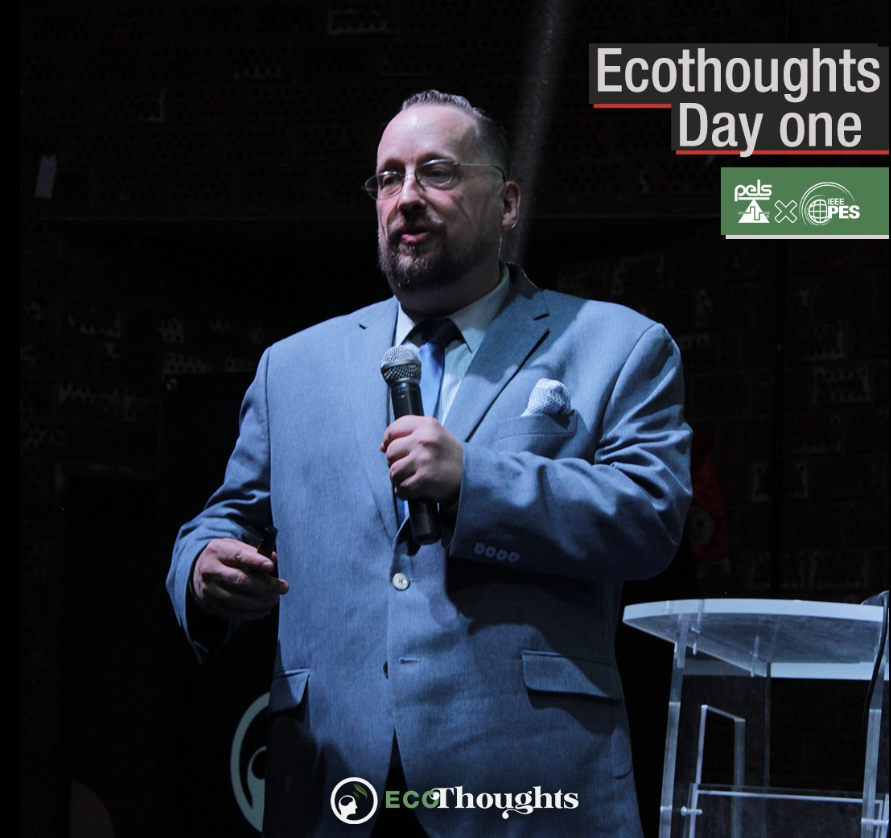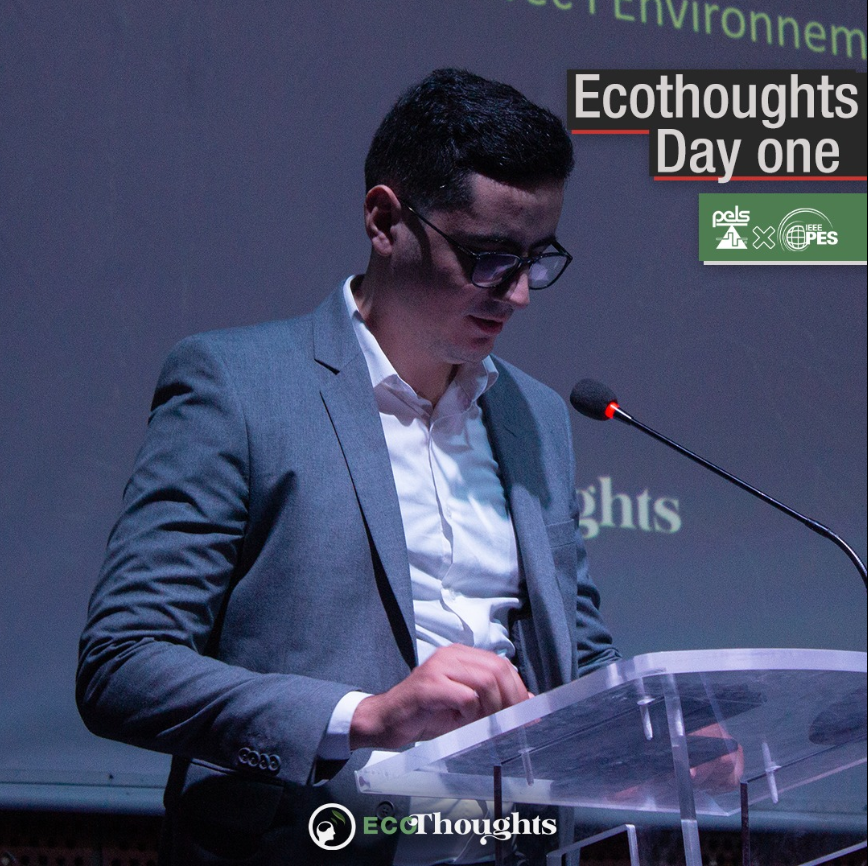Eco Thoughts
Event Report: Eco Thoughts – First Edition
Eco Thoughts, in its inaugural edition, successfully brought together a vibrant community of environmental enthusiasts, professionals, and students to explore the pressing issues of sustainability. Held over two days, the event provided participants with a comprehensive look into the current trends and future directions of sustainable practices. The sessions, speakers, and hands-on activities not only informed but also engaged the audience in meaningful discussions and challenges surrounding sustainability.
Day 1: Engaging Insights and Thought-Provoking Discussions
The first day of Eco Thoughts kicked off with a grand opening ceremony, setting the stage for what promised to be an inspiring and educational experience. Participants were introduced to a range of critical topics, starting with foundational concepts in sustainability, such as carbon footprint, Environmental, Social, and Governance (ESG) criteria, and Life Cycle Assessment (LCA). These introductory sessions laid the groundwork for deeper exploration in the following discussions.
The session on carbon footprint was particularly insightful, helping attendees understand how individual and corporate actions contribute to climate change, while the ESG talk provided clarity on how businesses are integrating sustainability into their core operations. The LCA session offered an eye-opening look at how every product, from its raw material sourcing to its end-of-life disposal, impacts the environment. The speakers were not only knowledgeable but also engaging, offering a mix of data, real-world case studies, and forward-thinking solutions.
Following these sessions, keynote speeches from prominent sustainability leaders further captured the audience's attention. The speakers shared their expertise on cutting-edge sustainability practices and visions for a greener future. These presentations sparked thought-provoking discussions, as industry experts outlined potential pathways for addressing global sustainability challenges.
The panel discussions that followed were equally engaging. A diverse group of speakers discussed various aspects of sustainability, ranging from corporate responsibility to the role of government in supporting environmental policies. The discussions were dynamic, with panelists offering different perspectives that helped deepen participants' understanding of how businesses, governments, and individuals can contribute to a more sustainable future.
The audience actively participated throughout the day, asking insightful questions and sharing their own thoughts. This engagement highlighted the importance of collaboration and dialogue in addressing the multifaceted issues surrounding sustainability. The first day of Eco Thoughts not only provided valuable information but also served as a platform for forging connections and sharing ideas among like-minded individuals.
Date and Time
Location
Hosts
Registration
Speakers
Steven
LCA and ESG
LCA (Life Cycle Assessment):
Life Cycle Assessment (LCA) is a method used to evaluate the environmental impact of a product, process, or service throughout its entire life cycle. This includes all stages from raw material extraction, manufacturing, and transportation to use, disposal, and recycling. LCA helps to identify areas where environmental improvements can be made, offering a comprehensive view of a product's sustainability.
The typical stages of LCA are:
- Goal and Scope Definition – Clarifying the purpose and boundaries of the assessment.
- Inventory Analysis – Collecting data on the inputs and outputs (e.g., energy, materials, emissions).
- Impact Assessment – Evaluating the potential environmental impacts (e.g., global warming potential, resource depletion).
- Interpretation – Analyzing the results and making recommendations for improvements.
LCA helps organizations make more informed decisions about sustainability and reduce the environmental footprint of their products.
ESG (Environmental, Social, and Governance):
ESG refers to the three central factors used to evaluate the sustainability and ethical impact of an investment or business operation. Companies and investors increasingly consider ESG criteria to assess long-term value and risk.
- Environmental: Focuses on how a company manages its environmental impact, such as carbon emissions, waste management, and resource usage.
- Social: Looks at a company’s relationships with employees, suppliers, customers, and the communities where it operates. This includes worker conditions, diversity, and community engagement.
- Governance: Concerns how a company is governed, including leadership structure, executive compensation, transparency, and ethical behavior.
ESG factors help investors and organizations align business practices with broader societal values, reduce risks, and identify sustainable opportunities.
Biography:
Steven is an award-winning Corporate Sustainability and Sustainable/Global Development professional with 12+ years of experience both domestically and globally. Specialties include ESG Planning & Reporting; Sustainability and Strategy; Circular Economy; Upcycling; Food Security; and Impact Measurement and Management for the SDGs.
Steven is the CEO of Pearce Sustainability Consulting Group (PSCG) which was named Best Sustainability Consulting Firm 2023 - California by Wealth & Finance International.
Steven has given workshops globally on issues such as The Triple Bottom Line; Sustainable Development; and ESG. His research on food insecurity issues for Harvard was presented to the Tunisian Ministry of Nutrition. Research has also been published in academic journals in Japan and the MENA Region. He has also been instrumental in creating policy relating to socio-political issues that was used by the DoD to help mitigate honesty in the former Afghani government. He also has research papers pertaining to socio-political issues that was taught at The American Military University to help formulate policy to peacefully deradicalize extremist Islamist groups in war-torn regions. Steven has consulted to MNCs, nation-states, and NGOs.
Steven has extensive global development experience, consulting for Sustainable Development Projects for the Tunisian Ministry of Environment (ANGED); The Tunisian Ministry of Health; and the Tunisian Ministry of Sustainability and Development; The Tunisian Ministry of the Environment; and the African Development Bank (AFDB) to ensure Sustainability Compliance for funded development projects.
Steven is currently in the Global Development Practice Graduate Program at Harvard University Extension School.
Please feel free to follow me and reach out if you have any questions or needs that I can help you with.
LCA (more in depth)
Biography:
Mariem Hassène, a former IEEE member, is an industrial biologist with a master's degree in renewable energies. Her passion for a sustainable future has led her to Sustainable Development Goals 7 (Affordable and Clean Energy) and 13 (Climate Action). SHE's a staunch advocate for energy transition, project management, eco-responsible strategies, advanced planning, and bioenergy. Her goal is to actively contribute to a cleaner, greener world by putting my skills and expertise to work on innovative and sustainable projects. Passionate, determined, and ready to take on challenges, she believes in a future where clean energy and environmental responsibility are the cornerstones of our world.
Sustainability in Engineering
Biography:
Expert in sustainable energy solutions with a focus on renewable energy projects, covering the full spectrum from business development and feasibility studies to overseeing construction projects and managing ongoing operations and maintenance tasks.
He has been involved in a broad portfolio of feasibility studies, most notably the comprehensive oversight of nine initiatives aimed at bringing electricity to rural areas through the development of solar power solutions and hydroelectric plants. These initiatives were part of the Scaling-Up Renewable Energy Program (SREP) in Madagascar from 2019 to 2022, funded by the esteemed World Bank.
In terms of supervision and control of construction work, his notable achievements include piloting the Bizerte wind farms, with a total capacity of 190 MW. Currently, he is supervising the construction of several solar power plants with a combined capacity of around 5 MW for industrial self-consumption.




 Add Event to Calendar
Add Event to Calendar